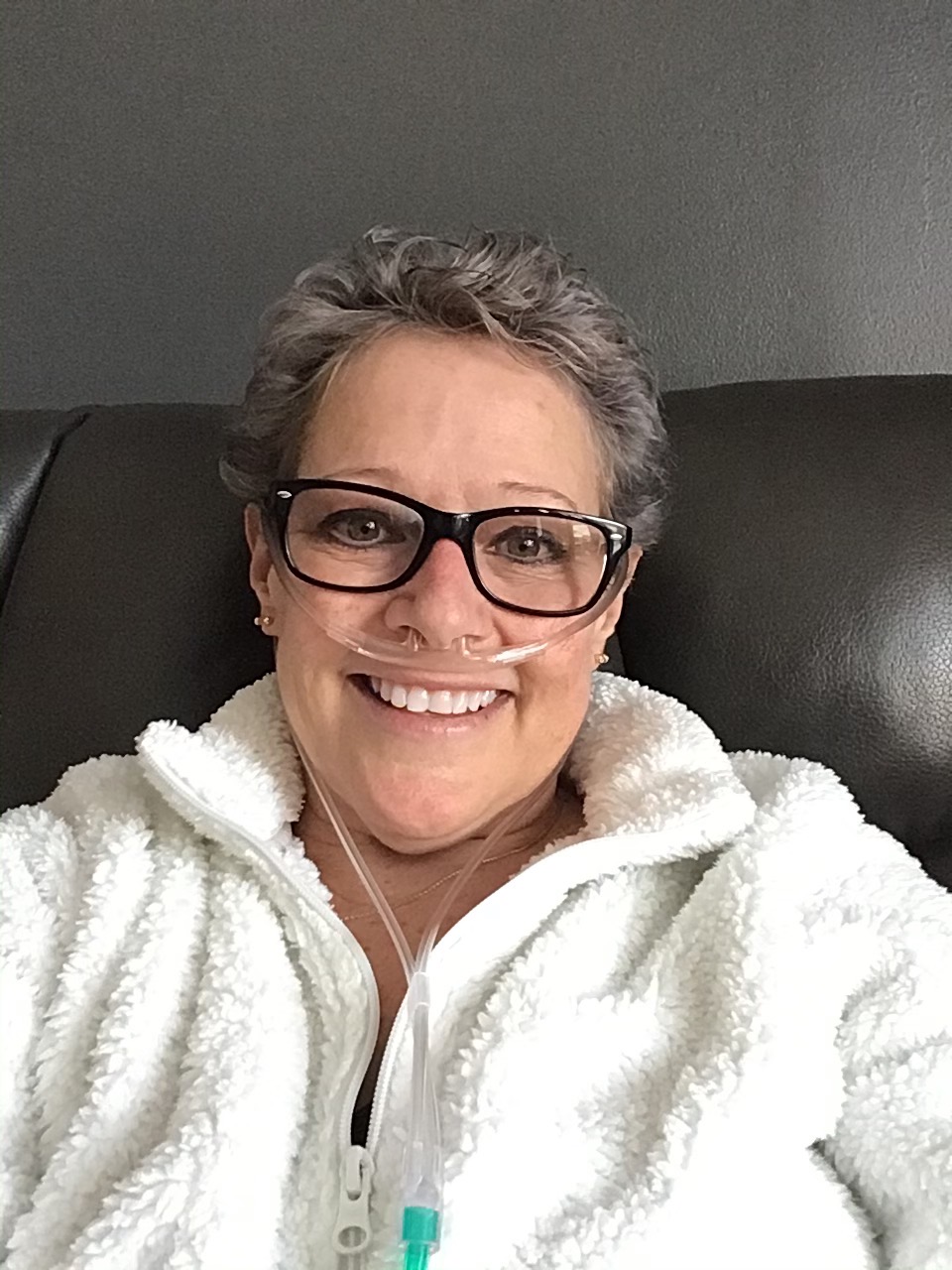Last month, Lindsay Brochu was ready to finally receive new lungs.

The 31-year-old woman from Almonte, Ont., was put on a waitlist for a Toronto transplant program on March 17. She signed a form consenting that she’d be ready for a double-lung transplant as soon as one was available.
“Emotionally and mentally, I was preparing for that,” she said. “It’s draining, you ensure you’re prepared when you sign so that you’re ready for this… I was ready to go.”
Brochu moved in with her parents in Niagara region and waited to be called in for the surgery. Doctors told her it would take about a month for the organ to be available.
That same week, Ontario paused transplants that weren’t considered essential due to the COVID-19 outbreak. Some viable organs from deceased donors are not being used as procedures continue to be on hold.
The process of transplanting an organ requires suppressing the immune system of the recipient within a hospital setting, said Dr. Sam Shemie, an intensive care physician at the McGill University Health Centre and the medical advisor for organ donation at Canadian Blood Services.
“This puts them at high risk for COVID-19,” he said. “You also have them in the hospital right after the transplant, a place where there is a high amount of COVID-19 infections.”
Transplant programs are being paused across the country until the coronavirus crisis is managed, he explained.

Recent data from the Canadian Organ Replacement Register found that in 2018, 4,351 people were on a waitlist for an organ transplant. That year, 2,782 transplants were completed.
Canada doesn’t properly track data on organ donations, but he and others are looking at how other countries are managing transplants, said Shemie. There’s a clear worldwide trend indicating the number of organs available has decreased, he said.
“Other countries that do have the data have told us that injuries or illnesses that might lead to death and the possibility of organ donation has decreased a lot,” he said.
Traumatic brain injuries that may happen to someone through an accident outside the home have decreased as less people are outside, he said. Those cases usually provide many organ donations, he said.
Currently, transplants are being done in the most “urgent” cases where a patient will die if they don’t receive an organ, he said.
“We have to be really careful about who we transplant because your immune system is weakening,” he said. “We know that if you have had a transplant, and you get COVID-19, your risk of dying is about five times the average.”

Get daily National news
Waiting for a life-saving procedure
For Brochu, it’s taken years of doctors visits and monitoring her condition to get to the point where she was listed as a good candidate for a new pair of lungs.
The first signs of trouble started for her during a milestone moment in her life. While hiking in Hawaii in 2016, her boyfriend proposed to her at a volcano. But that journey to the top caused breathing difficulties, she said.

She’d had lived an active lifestyle beforehand, as she and her now-husband would often hike together.
Returning to Canada, Brochu visited a doctor, assuming the breathing issues were caused by the high altitude, lack of exercise or possibly asthma. She was then diagnosed with a rare lung disease called pulmonary hypertension.
Doctors told her she likely has a subcategory of the illness that is even rarer, and she’s currently waiting on a genetics test to confirm that.
The disease causes increased blood pressure within the arteries of the lungs and causes shortness of breath and exhaustion.
While her lung capacity is at about 30 per cent, her case isn’t considered urgent as she is still able to complete household tasks, with the help of provided oxygen. She had to quit her job as an x-ray technologist, as it was too physically demanding.
Brochu says the transplant would effectively cure her of the illness, as it replaces the diseased lungs with a new pair.
She is on other medication for now, but her doctors have told her that treatment isn’t sustainable for the long term and she needs new lungs. Without any treatment at all, a patient with her illness would have about five years to live from the point of diagnosis, she said.
“The fact that I’m on the list, I’m guaranteed to get the transplant. But now because it’s on hold, I just wake up every day grateful that I’m still here and I feel stable enough to keep going,” she said.
Fear of being infected with COVID-19 is also a concern as it would prevent her from getting the transplant if she is sick, she said.
“There’s no transplants being done, so everyone who voluntarily donated their organs or signed up to be a donor… they won’t be used to save any lives,” she said. “It’s really heartbreaking.”
‘It’s just really defeating’
In Ontario, there are over 1,600 people waiting for an organ transplant, according to the Trillium Gift of Life Network, Ontario’s tissue and organ donation agency.
Nearly 1,200 of the people waiting are in need of a kidney, while others require lungs, a heart or a liver.
Anyone waiting for an organ, including all Canadians with chronic illnesses who rely on consistent access to hospital, are under undue stress right now as systems are preoccupied with the new coronavirus, said Shemie.
“Each province has been reaching out to people on the waitlists to let them know what’s going on, to reassure them that the system is on this and will provide transplants when needed,” he said.
“Unless it’s urgent, patients will have to wait longer and this is very upsetting.”
Canadian Blood Services has been tasked by provincial governments to co-ordinate the transplant system in the country. It’s been difficult to find a balance between the needs of patients to be given an organ, along with their safety and vulnerabilities related to the coronavirus, he explained.
In the interim, agencies like the Kidney Foundation of Canada are working with Canadian Blood Services to keep waitlisted patients up-to-date about the status of their transplants, said Elizabeth Myles, national executive director of The Kidney Foundation of Canada, in a statement to Global News.
“This is an incredibly stressful time for patients. We continue to provide our peer support, short-term emergency financial assistance, and information and referral programs. In addition, the Foundation will be hosting a webinar with medical experts later this month to discuss the impacts of the pandemic on kidney transplant,” she said.

While Kelly Villeneuve, 53, feels supported by family and doctors while she is on the Ontario waitlist for a transplant, she says she’s been feeling anxious as she’s unsure when she can receive a new liver.
“You don’t want to be selfish, but it’s just really defeating,” said Villeneuve, who is from Sault-Ste. Marie, Ont. “You just have to sit back and just wait, that’s all you can do.”
Her seven doctors have expressed it could take until the summer to receive her transplant. She’s been on the waiting list since early December.
Villeneuve has a hereditary disease called alpha-1 antitrypsin deficiency, a genetic disorder that can cause lung and liver disease. She’s currently on oxygen and struggles with breathing, but her doctors believe a liver transplant would solve her lung issues as well, she said.
Tasks like making her bed, going up the stairs become “impossible” she said due to her illness.
Her condition isn’t considered urgent enough for a transplant while COVID-19 remains a concern in Canada, she explained.
But she says she isn’t sure how much worse her condition can get before she’s considered sick enough for a transplant during the pandemic.
“I keep pushing the transplant doctors, and I say ‘I can’t do squat, I can’t even stand at the stove without gasping for air’. How am I supposed to live? This isn’t living,” she said. “And they tell me they are doing what they can… but am I supposed to be on the floor?”
While she waits, Villeneuve says she encourages more Canadians to sign up to be organ donors, or to consider being live donors where you don’t have to be deceased to give someone else a new lease on life.
“There’s no organs out there. So when everything comes up again, take the time and look into being a live donor,” she said. “You’re doing something for people that’s unbelievable.”
Questions about COVID-19? Here are some things you need to know:
Health officials say the risk is low for Canadians but warn this could change quickly. They caution against all international travel. Returning travellers are asked to self-isolate for 14 days in case they develop symptoms and to prevent spreading the virus to others.
Symptoms can include fever, cough and difficulty breathing — very similar to a cold or flu. Some people can develop a more severe illness. People most at risk of this include older adults and people with severe chronic medical conditions like heart, lung or kidney disease. If you develop symptoms, contact public health authorities.
To prevent the virus from spreading, experts recommend frequent handwashing and coughing into your sleeve. And if you get sick, stay at home.
For full COVID-19 coverage from Global News, click here.













Comments
Want to discuss? Please read our Commenting Policy first.